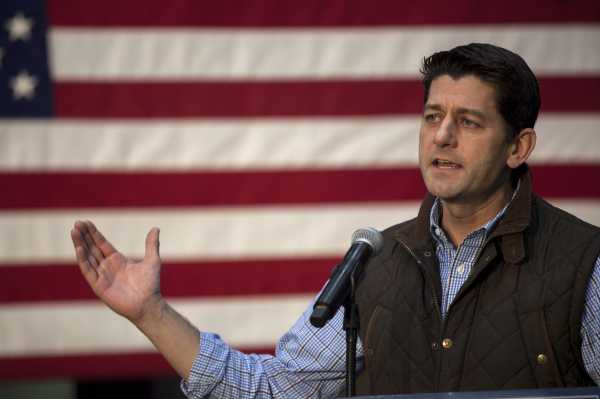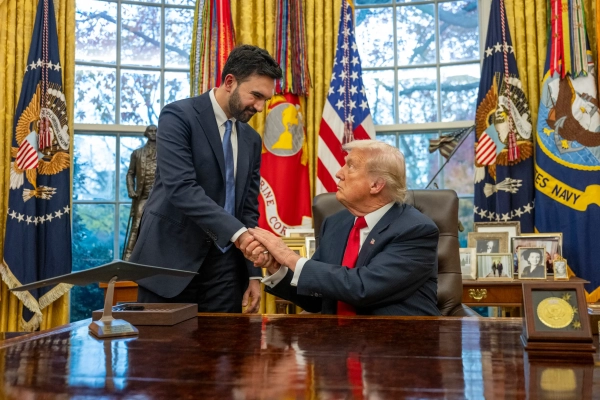 the year. Trump has other ideas.” />
the year. Trump has other ideas.” />
House Republicans will lose their majority in two months.
But until January 3 — when newly elected members of Congress are sworn in — Republicans still have full congressional control, and theoretically they could address their remaining agenda.
There’s already discussion among congressional aides, Washington policy wonks, and lawmakers about how Republicans will use that time. Will it be a mad dash to push through a conservative wish list, or will leaders try to keep the drama to a minimum?
So far, Republican leaders in Congress are signaling the latter. “We have to finish the farm bill, we have to finish funding the government,” Senate Majority Leader Mitch McConnell told reporters last week. McConnell did say the Senate would likely try to finagle funding for President Trump’s border wall, but indicated that it was probably not going to consider any other major immigration items before year’s end.
President Donald Trump, however, has hinted that he’s open to pushing yet another immigration fight.
Only eight years ago, when Democrats were faced with a similar reality, this short period of time proved to be among the most dramatic months of Congress; they passed a tax cut deal, repealed the military’s “don’t ask, don’t tell” policy, and even tried to push through the DREAM Act, only to fall a few votes short. There are certainly some Republicans who are itching to take some more votes before they give up the gavel.
Welcome to the lame-duck Congress. There’s a small chance it might not be so ineffectual.
Republican leaders seem like they don’t want any drama. It might be hard to avoid.
House Republicans look like they will lose close to 40 seats once all the ballots are tallied. As lawmakers come back to Congress for the final months of the year, they have to decide how productive they want to be.
An aide close to House Republican leadership summed up the priority list for the next two months as keeping the government open and passing the farm bill — a massive $867 billion legislative package that subsidizes agriculture and food assistance programs.
The idea of another fight on health care or immigration was met with silence.
It’s worth noting that current House Speaker Paul Ryan is on his way out, and after two years of running a drama-filled caucus that failed to pass any meaningful legislation on both of those policy areas, it’s not entirely surprising that he’s not keen on relitigating those fights in his final months. House Republicans are also about to have a hotly contested leadership fight, which might pull them away from actual legislating.
The story is similar in the Senate.
The biggest thing to watch for in the upper chamber is a possible funding skirmish when money runs out on December 7. McConnell signaled that he wanted to prevent another possible government shutdown but indicated earlier this week that a potential impasse over funding for a border wall could result in just that.
”We’re certainly going to try to help the president achieve what he’d like to do with regard to the wall and border security,” he told reporters. “We’re going to do the best we can to try to achieve the president’s priorities, and hopefully we will not be headed down that [shutdown] path.”
Currently, spending negotiations over the border wall are at a standstill; the House’s funding bill for the Department of Homeland Security has $5 billion and the Senate includes much less: $1.6 billion.
McConnell also emphasized that he wasn’t planning to slow the Senate’s efforts on confirming judicial nominees and intended to keep jamming through more in the course of this year.
“You know what my top priority is? It’s the judiciary,” he said. “We intend to keep confirming as many as we possibly can as long as we can do it.”
Sometimes lame-duck congressional sessions are very busy
When the Tea Party wave struck in 2010 and Democrats lost 63 seats and the House majority, Democrats went into overdrive.
“It’s official. Like it or not, this lame-duck session is the most productive of the 15 held since WWII,” Larry Sabato, a professor of politics at the University of Virginia, tweeted at the time.
In the span of two months, the Democratic-controlled House and Senate passed a tax deal extending the George W. Bush-era tax cuts and extending unemployment insurance, repealed “don’t ask, don’t tell,” and ratified a US-Russia nuclear arms reduction treaty.
Paired with Democrats’ landmark health care bill, the Affordable Care Act, which had passed earlier that year, 2010 proved to be an extraordinarily productive time for Democrats — and the majority of it came in December, when more pieces of legislation were passed than since March. They even tried to pass the DREAM Act, an immigration bill that would have created a path to citizenship for some undocumented immigrants. (It failed.)
Lame-duck sessions have long prompted mixed feelings, especially when power has changed hands between parties and outgoing lawmakers are scrambling to secure their legislative priorities.
“I hated lame-duck sessions,” former Senate Majority Leader Trent Lott, a Republican, told the New York Times in 2010. “You’re scrunched in between Thanksgiving and Christmas, a lot of people are mad about the election, you’ve got people voting on critical issues who are going to be gone in two weeks, and they’re always ugly.”
Immigration is a big unresolved issue
That said, it’s not lost on Trump that after two years of complete congressional control, he still hasn’t seen the conservative immigration policies he’s repeatedly promised his base.
In the lead-up to the midterm elections, Trump promised three major immigration reforms:
1) Funding for the border wall. This is one Trump’s longest-standing asks on immigration. He’s demanded everywhere from $5 billion to $25 billion to build the wall. (Multiple reports have found that building a border wall will actually cost much more than that.)
Democrats have been in lockstep against putting any funding toward a border wall from the start, but they’ve also been clear that they are willing to concede some funding for increased security and wall prototypes if Trump will agree to a legislative fix for the Deferred Action for Childhood Arrivals program. That might change when Democrats control the House.
2) An end to “catch and release.” “Catch and release” is what Republicans call the practice of releasing undocumented immigrants from detention and allowing them to live in the US while they wait for their asylum claims to be adjudicated. Trump’s administration has attacked this practice from the start, claiming it’s allowed for “widespread lawlessness,” as Vox’s Dara Lind explained. The Trump administration’s attempt to end “catch and release” is what ultimately led to the “zero tolerance” border policy and the separation of more than 2,500 immigrant children from their families.
The bipartisan backlash against family separations ultimately pushed the administration to reverse its policy, but the issue is not resolved. To fully address family separations, conservatives and Trump allies are calling for Congress to pass a law overturning a court order that prevents children from being detained indefinitely with their families at the border. This isn’t something lawmakers, past Trump’s most conservative allies on Capitol Hill, agree on.
3) Sweeping reforms to legal immigration. Every immigration proposal the White House has offered so far has demanded major changes to the legal immigration system, from getting rid of the diversity visa lottery program to ending family-based immigration. The idea is that people should only be allowed to enter the US if they demonstrate a valuable asset, instead of just being sponsored by their relatives. But Trump’s proposed reforms have all substantially cut the number of legal immigrants that would be allowed into the country, something that is a nonstarter for Democrats and that traditional Republicans are also uncomfortable with.
Republicans have voted on and failed to pass all of Trump’s biggest immigration policy requests, mostly because the more moderate members of the House Republican caucus, many of whom have lost their seats or are retiring, wouldn’t sign on, and conservatives wouldn’t sign on to less hardline proposals.
The impending doom of being in the minority has activated lawmakers to actually pass contentious policy in the past. If Trump pushes it, and with the midterms out of the way, it’s not completely out of the question.
Sourse: vox.com






